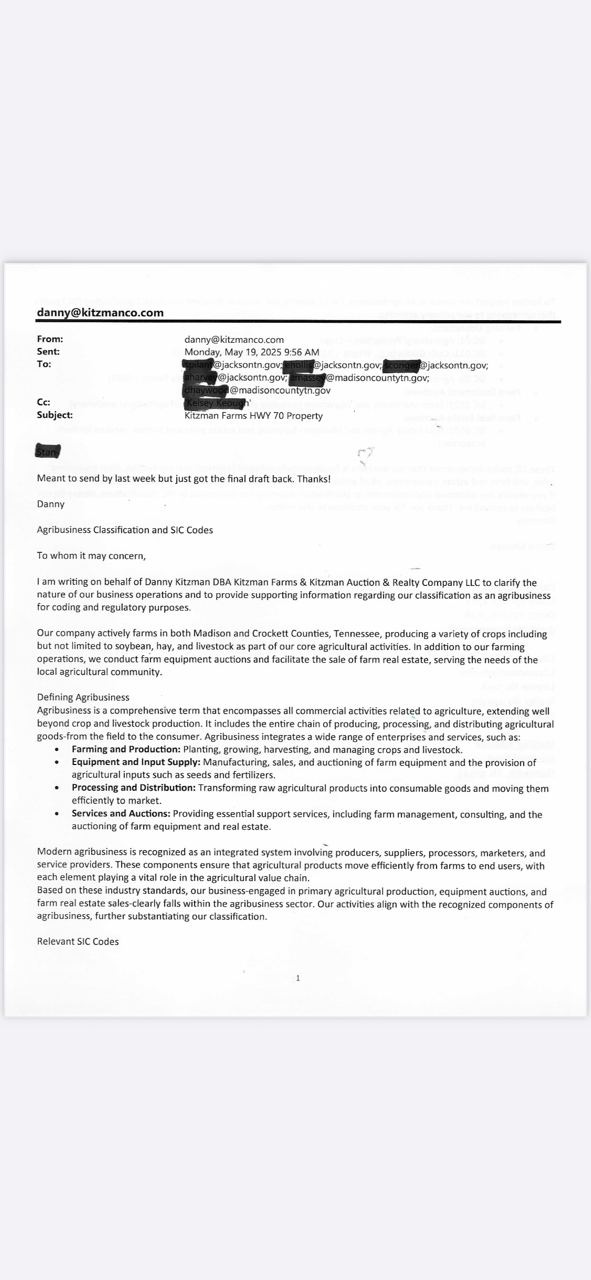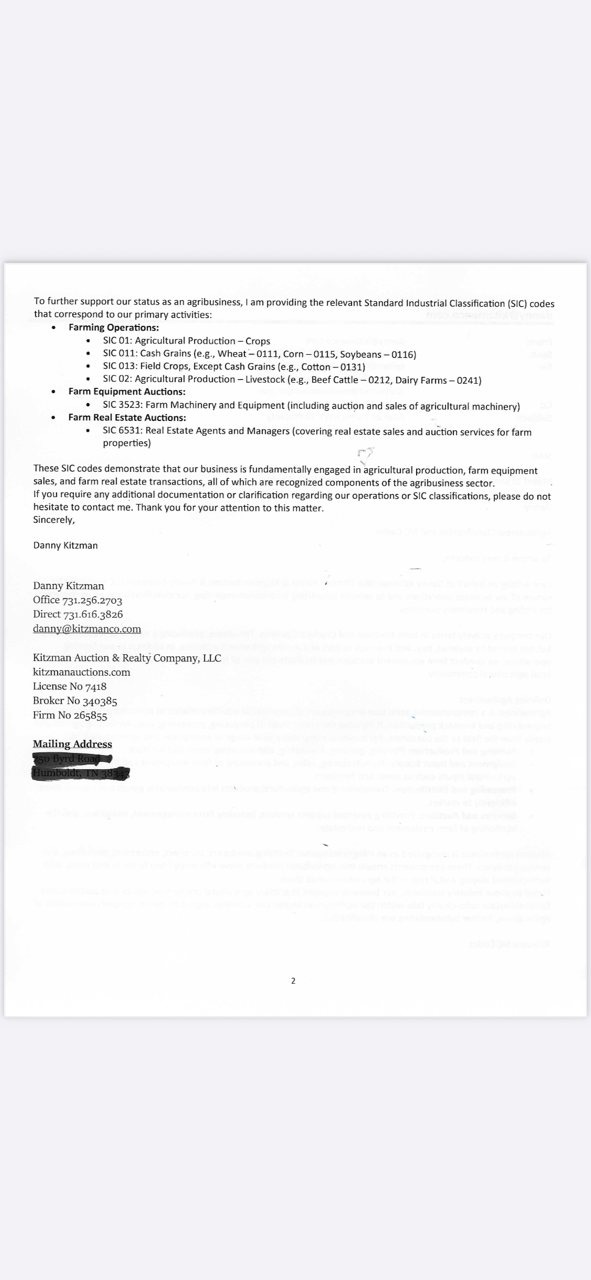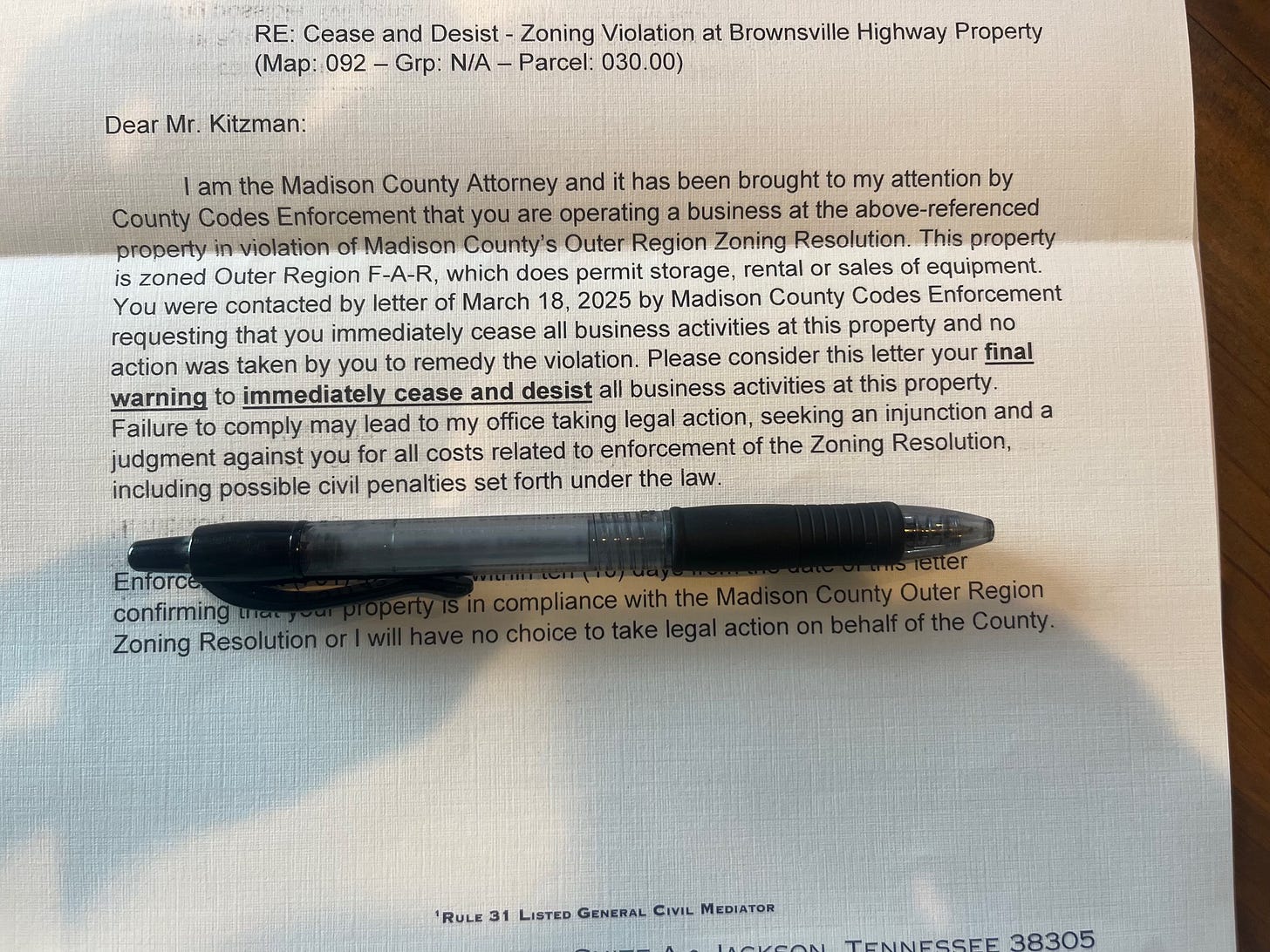Farm Equipment or Criminal Offense? The War on Common Sense Farming
When farmland becomes a battleground—how one Tennessee farmer's parked tractor ignited a county crackdown.
When Tennessee farmer Danny Kitzman parked his tractors along a muddy soybean field, he never expected to be slapped with zoning violations and legal threats. Now, county officials are calling it commercial misuse—while rural residents call it government overreach. Only one question remains: how did parking farm equipment on a farm become a crime?
A Tractor, a Soybean Field, and a Zoning Fight: Tennessee Farmer Faces Penalties for Parking Equipment
Danny Kitzman thought he was doing what any farmer would do when spring conditions turned muddy and logistics demanded flexibility: he parked some of his farm equipment on the edge of his soybean field. But what started as a simple, practical solution to a temporary problem has escalated into a full-blown legal battle with Madison County, Tennessee.
At the heart of the issue lies a gravel pad, a handful of tractors, and a bureaucratic interpretation of agricultural zoning. Now, Kitzman could face penalties and court action for something he and many farmers consider a normal part of rural life.
A Farmer, a Field, and a Gravel Pad
Danny Kitzman operates an 11-acre soybean field along Highway 70 in Madison County, Tennessee, not far from his main base in Crockett County. (https://www.agweb.com/news/machinery/tennessee-farmer-penalized-county-parking-ag-equipment-soybean-field) He’s more than just a row-crop farmer—he’s involved in land services, equipment auctions, and agribusiness ventures.
In March 2024, delayed planting conditions due to wet weather prompted Kitzman to park several pieces of agricultural equipment—tractors, trailers, and a tracked excavator—on a gravel pad beside the field. For him, it was a temporary and necessary move during a challenging season.
County Intervention: Zoning vs. Agriculture
On March 18, Madison County code enforcement notified Kitzman that the machinery storage violated local zoning ordinances. (https://tennesseeconservativenews.com/madison-county-penalizes-farmer-for-parking-farming-equipment-in-his-own-soybean-field/) According to the county, the equipment implied a commercial or industrial use not permitted on that parcel.
Kitzman pushed back, explaining the equipment was tied to the farm and its annual soybean crop. (https://tennesseeconservativenews.com/madison-county-penalizes-farmer-for-parking-farming-equipment-in-his-own-soybean-field/) He noted that the field was still in agricultural production and that the equipment was used in connection with his farm operations—not as part of an unlicensed business.


Escalation and Threat of Legal Action
Kitzman continued to communicate with county officials, referencing Tennessee’s agricultural exemptions and his right to use his farmland for agricultural purposes. But on May 30, he received a certified letter from the county with an ultimatum: remove the equipment within 48 hours or face a legal injunction, civil penalties, and cost recovery for enforcement. (https://tennesseeconservativenews.com/madison-county-penalizes-farmer-for-parking-farming-equipment-in-his-own-soybean-field/): remove the equipment within 48 hours or face a legal injunction, civil penalties, and cost recovery for enforcement.
The letter described the use of the property as an unauthorized commercial activity. It did not address Kitzman’s defense that this was farm use on farmland.
Community Response and Political Support
The situation quickly gained traction on social media after Kitzman shared the county’s enforcement letters. Public backlash was swift. Local farmers and rural residents questioned how parking tractors on farmland could be considered illegal.
Madison County Commissioner Gary Tippett and Mayor AJ Massey contacted Kitzman in response, indicating they were looking into the matter and offering support to resolve the dispute. (https://tennesseeconservativenews.com/madison-county-penalizes-farmer-for-parking-farming-equipment-in-his-own-soybean-field/), indicating they were looking into the matter and offering support to resolve the dispute. For many in the local ag community, the case touched a nerve about government overreach and inconsistency.
The Broader Tensions: Agriculture vs. Bureaucracy
At issue is the definition of “farm use.” Kitzman insists the equipment is related to seasonal work on his land and his broader agricultural operation. From his point of view, the zoning rule is being used to criminalize normal farm behavior.
He also noted inconsistencies in how zoning is applied. Nearby solar farms, which occupy former farmland and serve commercial energy markets, have not faced similar zoning enforcement—despite being a more literal example of non-farm activity on agricultural land.
What happens to Kitzman
As of now, the county has not filed court proceedings, but the threat remains. If Kitzman does not comply, legal actions could include fines or forced removal.
Conversations between Kitzman and local officials are ongoing, and there is hope that mediation or county-level resolution may be possible. However, the case remains a potent symbol of the disconnect between local government policy and the realities of modern farming.
When Zoning Targets Common Sense
This is more than a local ordinance dispute—it’s a litmus test for how we treat working farmers in America.
If a farmer can’t store tractors on his own soybean field without being labeled a code violator, what does that say about the priorities of our zoning laws? Regulations should serve communities—not criminalize them for practical land use during a tough season.
Kitzman’s situation highlights a troubling pattern. Across rural America, farmers are increasingly targeted by vague or selectively enforced zoning rules. Whether it’s equipment storage, irrigation access, or building repairs, local governments are too often quick to punish and slow to understand.
In a time when food security and rural resilience are more critical than ever, penalizing farmers for doing their job sends the wrong message.
Madison County should reconsider its stance—not just for Kitzman, but for every farmer trying to keep their operation afloat amid unpredictable weather, rising input costs, and a tangle of red tape.
Let farmers farm. That’s not just a slogan—it’s a principle worth defending.





